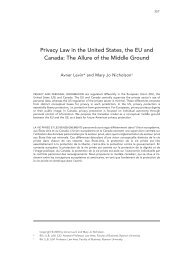Commentary on Fichte's “The Illegality of the Unauthorised ... - uoltj
Commentary on Fichte's “The Illegality of the Unauthorised ... - uoltj
Commentary on Fichte's “The Illegality of the Unauthorised ... - uoltj
You also want an ePaper? Increase the reach of your titles
YUMPU automatically turns print PDFs into web optimized ePapers that Google loves.
(2008) 5:1&2 UOLTJ 141<br />
<str<strong>on</strong>g>Commentary</str<strong>on</strong>g> <strong>on</strong> Fichte 157<br />
In Fichte’s rejecti<strong>on</strong> <strong>of</strong> Reimarus’ utilitarian positi<strong>on</strong>, we see in effect<br />
a rejecti<strong>on</strong> <strong>of</strong> copyright as a purely ec<strong>on</strong>omic right and <strong>the</strong> recogniti<strong>on</strong> <strong>of</strong> <strong>the</strong><br />
moral rights <strong>of</strong> <strong>the</strong> author. While Roberta Rosenthal Kwall attributes <strong>the</strong> first<br />
articulati<strong>on</strong> <strong>of</strong> <strong>the</strong> moral rights view to Immanuel Kant, 76 Kant articulates <strong>on</strong>ly<br />
<strong>on</strong>e aspect <strong>of</strong> moral rights, namely, <strong>the</strong> right <strong>of</strong> disclosure. As Kwall explains, this<br />
right entitles <strong>the</strong> author to refuse to publish a work until he or she deems it ready<br />
for publicati<strong>on</strong>. 77 This aspect <strong>of</strong> moral rights is clearly espoused by Kant when<br />
he argues that <strong>the</strong> author has <strong>the</strong> exclusive right to choose who will present his<br />
discourse to <strong>the</strong> public. 78<br />
In c<strong>on</strong>trast, Fichte comes nearer to articulating <strong>the</strong> origin <strong>of</strong> moral rights<br />
in <strong>the</strong> unique form that <strong>the</strong> author has given <strong>the</strong> work, which reflects <strong>the</strong> unique<br />
nature <strong>of</strong> his thought processes. As well, Fichte justifies <strong>the</strong> author’s intellectual<br />
property right in a book by means <strong>of</strong> a different aspect <strong>of</strong> moral rights, namely,<br />
<strong>the</strong> right to be recognized as <strong>the</strong> author <strong>of</strong> <strong>the</strong> work (also called a right <strong>of</strong><br />
paternity). 79 Admittedly, Kant does allude to <strong>the</strong> right <strong>of</strong> paternity in his 1885<br />
essay <strong>on</strong> <strong>the</strong> illegality <strong>of</strong> reprinting, in which he states that a book is like a speech,<br />
and “it is a c<strong>on</strong>tradicti<strong>on</strong> to deliver in <strong>on</strong>e’s own name a speech that, by <strong>on</strong>e’s<br />
own announcement and in keeping with <strong>the</strong> public’s demand, is to be <strong>the</strong> speech<br />
<strong>of</strong> ano<strong>the</strong>r.” 80 However, Kant does not explain what <strong>the</strong> unique aspects <strong>of</strong> this<br />
speech are that express <strong>the</strong> pers<strong>on</strong>ality <strong>of</strong> <strong>the</strong> author, <strong>the</strong>reby forbidding o<strong>the</strong>rs<br />
to appropriate it. In c<strong>on</strong>trast, Fichte’s forceful justificati<strong>on</strong> <strong>of</strong> moral rights based<br />
<strong>on</strong> <strong>the</strong> recogniti<strong>on</strong> <strong>of</strong> <strong>the</strong> author’s pers<strong>on</strong>ality expressed in <strong>the</strong> form <strong>of</strong> <strong>the</strong> work<br />
foreshadows <strong>the</strong> modern view that “<strong>the</strong> essence <strong>of</strong> a moral rights injury lies in its<br />
assault up<strong>on</strong> <strong>the</strong> author’s pers<strong>on</strong>ality, as that pers<strong>on</strong>ality is embodied in <strong>the</strong> fruits<br />
<strong>of</strong> her creati<strong>on</strong>.” 81 This justificati<strong>on</strong> has been <strong>the</strong> foundati<strong>on</strong> <strong>of</strong> developments in<br />
c<strong>on</strong>tinental European copyright law, which has tended to protect moral rights,<br />
although <strong>the</strong>se rights have not traditi<strong>on</strong>ally been given direct recogniti<strong>on</strong> in<br />
Anglo-American law. 82 *<br />
7. OTHER FORMS OF INTELLECTUAL PROPERTY AND THE REJECTION OF<br />
THE LABOUR THEORY OF PROPERTY<br />
Fichte c<strong>on</strong>trasts books with o<strong>the</strong>r forms <strong>of</strong> intellectual property. He explains<br />
that products <strong>of</strong> mechanical art differ from books because <strong>the</strong> form <strong>of</strong> mechanical<br />
art is not an expressi<strong>on</strong> <strong>of</strong> <strong>the</strong> unique pers<strong>on</strong>ality <strong>of</strong> <strong>the</strong> creator. Ra<strong>the</strong>r, its form<br />
is determined by <strong>the</strong> c<strong>on</strong>cept behind <strong>the</strong> functi<strong>on</strong>ing <strong>of</strong> <strong>the</strong> device. While those<br />
who craft mechanical devices can have greater or less skill in <strong>the</strong> executi<strong>on</strong> <strong>of</strong> <strong>the</strong><br />
76. Roberta Rosenthal Kwall, “‘Author-Stories’: Narratives Implicati<strong>on</strong>s for Moral Rights and Copyright’s Joint Authorship<br />
Doctrine,” (2001) 75:1 Sou<strong>the</strong>rn California Law Review 1–64, at p. 19.<br />
77. Roberta Rosenthal Kwall, “Copyright and <strong>the</strong> Moral Right: Is an American Marriage Possible?” (1985) 38:1<br />
Vanderbilt Law Review 1–100, at p. 5.<br />
78. Kant, “V<strong>on</strong> der Unrechtmäßigkeit des Büchernachdrucks,” supra note 9 at p. 81.<br />
79. Kwall, “Copyright and <strong>the</strong> Moral Right,” supra note 77 at pp. 5, 7.<br />
80. Kant, Practical Philosophy, supra note 9 at p. 34.<br />
81. Kwall, “‘Author-Stories,’” supra note 76 at p. 24.<br />
82. For a comparative history <strong>of</strong> French and American copyright law in this regard, see Jane C Ginsburg, “A<br />
Tale <strong>of</strong> Two Copyrights: Literary Property in Revoluti<strong>on</strong>ary France and America,” in Sherman and Strowel, Of<br />
Authors and Origins, supra note 12, 131–158.









